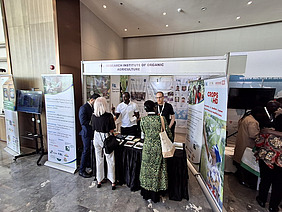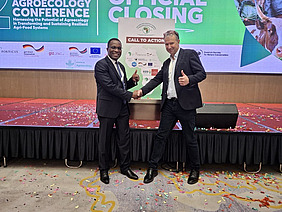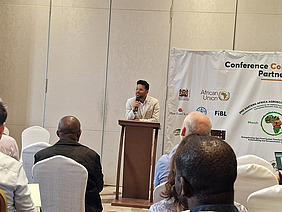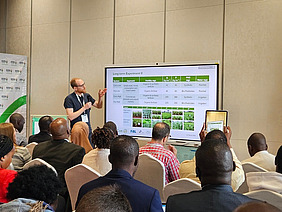Last month, FiBL took a science lead at the 2nd Eastern Africa Agroecology Conference (EAAC), held in Nairobi, Kenya. During the conference, five FiBL experts showcased evidence-based narratives for the agroecology and organic movement through research and development projects like SysCom (Farming Systems Comparison in the Tropics), CROPS4HD (Consumption of Resilient Orphan Crops & Products for Healthier Diets), AOMD (Accelerating the Organic Market Development in Kenya), and SustainSahel.
Markus Arbenz from FiBL held the first keynote and also moderated the final session of the 2nd Eastern Africa Agroecology Conference, which concluded with a powerful Call to Action. EAAC 2025 urged farmers, stakeholders across the value chain, service providers, consumers, and policymakers to embrace agroecological transformation for the benefit of people, society, and the planet. Looking ahead to the next two years, African agroecology stakeholders plan to reconvene to exchange knowledge and assess progress. FiBL, with its wealth of scientific data, innovative technologies, best practices, and methodologies, remains committed to supporting system transition projects and policy frameworks.
Agroecology far outperforms green revolution strategies
The conference also served as a platform for addressing critical questions, such as: can agroecology and organic agriculture address malnutrition? Are these systems productive and profitable for farmers? Do they benefit the climate, biodiversity, and natural resources? Can they make the food system more resilient and scalable?
The answer is, of course, yes – when done correctly and with sufficient time for stakeholders and ecosystems to transition, agroecology far outperforms green revolution strategies. FiBL's flagship projects in Africa – Syscom, CROPS4HD, AOMD, Africa Organic Manual, and SustainSahel – demonstrate the successful integration of agroecological practices.
In the long term, FiBL's strategy is to support partners in the transition towards agroecology and organic agriculture, offering multi-perspective solutions and providing evidence that strengthens the agroecology and organic narratives across Africa's food systems.
As momentum builds from EAAC 2025, FiBL remains steadfast in transforming insight into action, ensuring agroecology is not just discussed, but deeply rooted in practice across the region. With science as its compass and collaboration as its engine, FiBL continues to bridge ambition and implementation in the agroecological transition Africa deserves.
Further information
Contact
Links
- fibl.org: FiBL podcast on organic agriculture for food security in the Global South with Beate Huber (in German)
- youtube.com: Closing ceremony of EEAC 2025
- ea-agroecologyconference.org: Conference website
FiBL's flagships projects in Africa
- systems-comparison.fibl.org: SysCom Kenya
- sustainsahel.net: SustainSahel
- crops4hd.org: CROPS4HD
- organic-africa.net: Organic Africa Manual
- fibl.org: Accelerating the Organic Market Development in Kenya
FiBL would like to thank the following partners for the fruitful collaboration
- BVAT (Biovision Africa Trust)
- KOAN (Kenya Organic Agriculture Network)
- AFSA (Alliance for Food Sovereignty in Africa)
- PELUM (Participatory Ecological Land Use Management Association)
- AfrONet (African Organic Network)
- IFOAM Organics International (International Federation of Organic Agriculture Movements – Organics International)
- SDC (Swiss Agency for Development and Cooperation)
- LED (Liechtenstein Development Service)
- Swissaid
- LBS (Leopold Bachmann Stiftung)
- KALRO (Kenya Agricultural and Livestock Research Organization)
- GIZ/KCOA (Deutsche Gesellschaft für Internationale Zusammenarbeit / Knowledge Hub for Organic Agriculture in Africa)
- CCARDESA (Centre for Coordination of Agricultural Research and Development for Southern Africa)
- GFRAS/AFAAS (Global Forum for Rural Advisory Services / African Forum for Agricultural Advisory Services)
- FARA (Forum for Agricultural Research in Africa)
- ICIPE (International Centre of Insect Physiology and Ecology)
- TPP (Tropical Pesticides Research Institute)
- SNV (SNV Netherlands Development Organisation)







